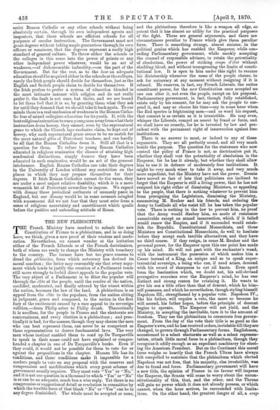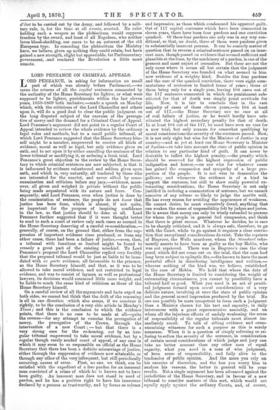THE NEW PLEBISCITITM.
THE French Ministry have resolved to submit the new Constitution of France to a plebiscitum, and in so doing have, we think, given a new proof of their wisdom and mode- ration. Nevertheless, we cannot wonder at the irritation either of the French Liberals or of the French doctrinaires, both of whom are ready to charge the Ministry with treachery to the country. The former have but too grave reasons to dread the plebiscites, from which autocracy has derived its moral sanction ; the latter may reasonably say that every argu- ment which tends to justify the creation of a Parliament tends still more strongly to forbid direct appeals to the popular vote. The very object of a Parliament is to filter the popular will through the elite of the people, until the resolve of the nation, modified, moderated, and finally uttered by the wisest within the nation, becomes the law of the land. A plebiscitum is an appeal from the elite to the populace, from the nation sitting in judgment, grave and composed, to the nation in the first fury of the excitement caused by a rare appeal to its sovereign volition,—from Philip sober to Philip drunk. Theoretically it is needless, for the people in France and the electorate are conterminous, and every election is a plebiscitum ; and prac- ticallyit is bad, for the masses, though they may choose the men who can best represent them, can never be as competent as those representatives to decree fundamental laws. The very men whose instinct enabled them to send up De Tocqueville to speak in their name could not have explained or compre- hended a chapter in one of De Tocqueville's books. Even if they could, it would not be possible for them to vote for or against the propositions in the chapter. Human life has its conditions, and those conditions make it impossible for a modern people to vote on any proposal with the reserves and compromises and modifications which every great scheme of government usually requires. They must vote "Yes" or "No," and it is not one question in a thousand to which "Yes" or "No" is or can be an adequate, much less a wise reply. Yet there is no compromise or suggestion of detail or resolution in committee-by which the terrible force of that blank "No" or "Yes" can be in any degree diminished. The whole must be accepted or none, and the plebiscitum therefore is like a weapon all edge, so-- potent that it has almost no utility for the practical purposes. of the fight. These are general arguments, and there are circumstances peculiar to France which give. them peculiar force. There is something strange, almost sinister, in the political genius which has enabled the Emperor, while cow- ceding Parliamentary government, while meekly accepting- the counsel of responsible advisers, to retain the potentiality' of absolutism, the power of striking coups d'Itat without shedding blood, and without transgressing the limits of consti- tutional law. It is open to him under this right to resume- his dictatorship whenever the mass of the people choose, to- ask for autocracy at any moment without resigning if it is- refused. He reserves, in fact, say French Liberals, the entire- constituent power, for the new Constitution once accepted no one can alter it, not even the people, except on his proposal.. Parliamentary government, in fact, though fully established, exists only by his consent, for he may ask the people to sus- pend it, and may so choose his time—say in some hour when. the Red spectre is frightening men—and so word his request, that consent is as certain as it is irresistible. He may even, whisper the Liberals, compel an assent by fraud or force, and we shall have no remedy, for he is invested by law and pre-- cadent with the permanent right of insurrection against free, institutions.
There is no answer to most, or indeed to any of these arguments. They are all perfectly sound, and all very much- beside the purpose. The question for the statesmen who now control the policy of France is not, as doctrinaires put it,. whether they shall vest the potentiality of absolutism in the- Emperor, for he has it already, but whether they shall allow. him to use it in defence of moderately free institutions. It. might be very much wiser to take it away, and very mud's more expedient, but the Ministry have not the power. Events, have moved so fast of late that politicians are inclined to forget that the Emperor is still a living power, that he has not- resigned his right either of dismissing Ministers, or appealing to the people, that there is nothing whatever to prevent him, from proroguing the Legislature, dismissing the Ministry,: summoning IL Rouher and- his friends, and ordering thg- Army to fusillade all who resist.till he has taken the popular vote. There is nothing in the law to prevent him, no proof that the Army would disobey him, no mode of resistance conceivable except an armed insurrection, which if it failed'. would renew the Empire, and if it succeeded would estab- lish the Republic. Constitutional Monarchists, and these Ministers are Constitutional Monarchists, do well to hesitate- before they accept such terrible alternatives; and they have- no third course. If they resign, in come M. Rouher and the- personal power, for the Emperor upon this one point has made- up his mind. He will not part with the enchanter's wand, with the instrument the possession of which makes him a Cassar instead of a King, an unique and so to speak super- terrestrial sovereign, a being who can, if need arises, descend with his sword of sharpness to cut all knots. Even apart from the fascination which, we doubt not, his self-devised prerogative exercises over the Emperor's mind, he has one and strong reason for retaining it. He wants to give his son a title other than that of descent, which he him- self possesses, and which he nevertheless, though styling himself. Napoleon III., strengthened by a popular vote. Napoleon IV., like his father, will require a vote, the more so because he. will ascend, his father hopes, before the principle of descent- begins to operate. The Emperor will not yield, and the Ministry, in accepting the inevitable, turn it to the account of freedom. They use the plebiscitum to consecrate free govern- ment. From the day of the vote their title is as good as the Emperor's own, and he has received orders, inviolable till they are- changed, to govern threugh Parliamentary forms. Englishmen, accustomed to a select electorate aspwell as a select represes.- tation, attach little moral force to a plebiscitum, though they recognize it oddly enough as an expedient machinery for elect- ing the American President. But on the Continent this moral' force weighs so heavily that the French Ultras have always- felt compelled to maintain that the plebiscitum which elected Napoleon was not free, that his majority, else irresistible, wan due to fraud and force. Parliamentary government will have- a new title, the opinion of France in its favour will impress. the Emperor, the Senate will cease to worry about the uncoil. stitutionality of this, that, and the other, and the Throne- will gain. no power which it does not already possess, or which cannot, when the hour arrives, be surrounded with limita- tions. On the other hand, the greatest danger of all, a coup, d'gtat to be carried out by the Army, and followed by a mili- tary rule, is, for the time at all events, averted. No ruler holding such a weapon as the plebiscitum would suppress freedom by the sword, and least of all Napoleon, who neither loves blood-shedding, nor cares to be an autocrat of the old European type. In conceding the plebiscitum the Ministry have, we believe, given up nothing they could retain, but have gained a new strength, slight but appreciable, for Parliamentary government, .and rendered the Revolution a little more remote.



































 Previous page
Previous page